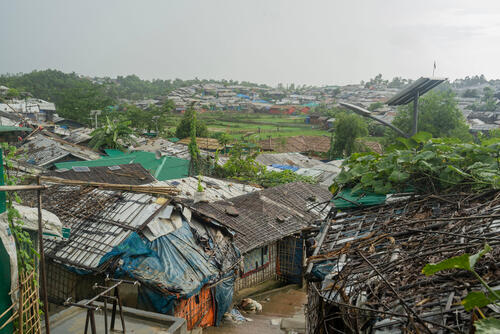Five years have passed since horrific violence unfolded in Rakhine state, Myanmar. Thousands of Rohingya people were killed by the Myanmar military. MSF alone documented 6,700 violent deaths.
Around 770,000 people fled for their lives to Bangladesh. They joined others who had already sought refuge from previous cycles of violence and together now make up one million people stranded in Cox’s Bazar area of Bangladesh.
Below we share some testimonies from Rohingya people living in refugee camps in Cox’s Bazar, whose health, water, sanitation, and protection needs remain immense. At the same time, the roots cause of Rohingya suffering – statelessness – is no closer to being addressed.
Tayeba Begum, fled Myanmar in 2017 with her children
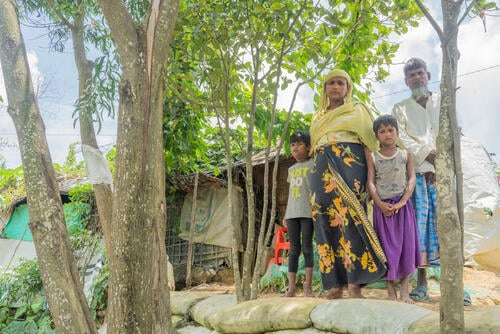
“My twin girls, Nur Ankis and Nur Bahar, were only six-month-old babies when we escaped from our homeland in Myanmar. After the killings began, we couldn’t stay in Myanmar any longer - the military were brutally murdering Rohingya and burning their houses.
When I fled with my babies, we crossed jungles and muddy roads in the soaking rain to get to Bangladesh. After reaching the border, people were resting wherever they could, but there was nowhere to shelter. We ate whatever we could find to survive. My daughters became weak and vomited whenever I tried to feed them. They suffered for a long time as it was difficult to find medicine when we arrived.
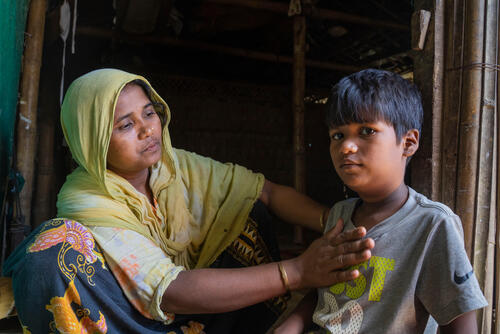
A few days after our arrival [in Cox’s Bazar], shelters were built for us out of cloth and bamboo. Now, we live here in the refugee camps. It has been five years of living in distress.
We depend on food assistance and worry about what to feed the children and if it’s enough. We worry about how to clothe them and how to educate them.
I long for peace. If we can ever live peacefully again in Myanmar, we will return. Why wouldn’t we return if justice is served to us and we are given citizenship? Is it not our homeland also? But how can we return if our rights are not ensured? Where will we live, since our houses have been destroyed? How can we go back if our children could be taken away and murdered?
You can keep us here or transfer us to another country, we will not refuse, but I would not go back to Myanmar without justice being served.”
Anwar, 15 years old, fled violence in Myanmar
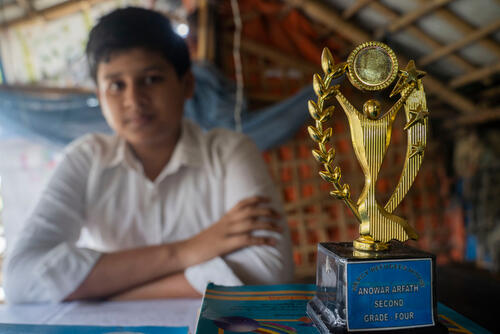
“My name is Anwar. I am a student from Myanmar. We escaped our neighbourhood in Myanmar and now live in the Jamtoli refugee camp in Bangladesh.
I remember when I ran away from Myanmar with my family. It was one afternoon, when the army attacked our neighbourhood and we had to run to a nearby area. When they torched our houses, we had to run further. We survived but many relatives and neighbours were murdered.
We travelled a long way to seek safety. I remember it was almost 12 days of running and walking before we reached Bangladesh. It was dangerous: we walked unfamiliar roads, climbed hills and even crossed water. We saw a lot of dead bodies on the way.
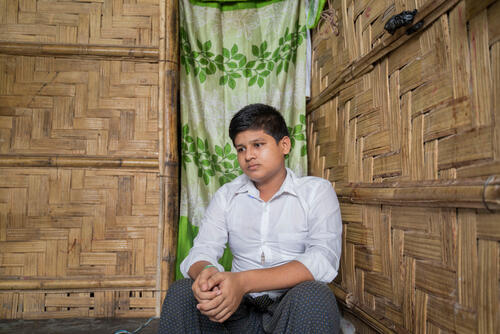
I was a student at school when we escaped, so when I came here my education was interrupted. I was a good student with high grades. I like learning, but now I can’t study or get the books I need.
My dream was to become a doctor, to be useful to the community. Since my childhood, I have seen doctors helping people and doing their best. I understand now that the dream might never come true. Still, I feel happy when I go to classes and meet my friends. We try to be happy while studying and playing.
Our life in the camp is not easy. The incentive my father earns is not enough to support my family. And sometimes when I come back from school at night, I feel unsafe.
I would like to address young people like me around the world. Please use the opportunity you have and learn as much as you can. My fellow Rohingya refugees and I do not have such an opportunity.”
Mohamed Hussein, 65, fled Myanmar five years ago
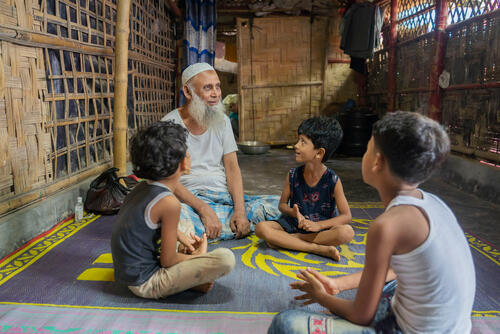
“One morning [in 2017], we heard gunshots. It was a Thursday night that actual shots were fired from the military post close to our home. The next morning, we heard some Rohingya people had been killed.
We were terrified, as the military were arresting and killing people everywhere. Running for our lives, we arrived here in Bangladesh. We were fortunate that we made it here alive. Bangladesh is doing a lot for us and standing by us.
When we first arrived here, we were very hopeful. But now, we feel stuck. Life has become difficult. I feel anxious about our future because our children are not being educated properly. Whether they stay here or return to Myanmar, what will they do without education? We have many sleepless nights thinking about this.
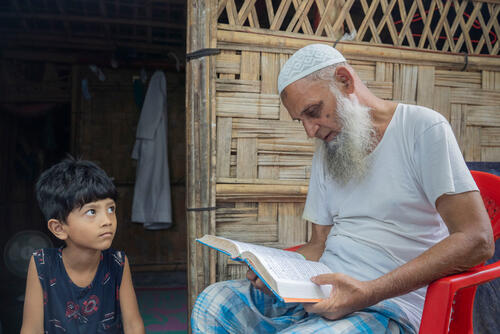
I receive medical care for my diabetes and high blood pressure at an MSF facility inside the camp, but treatment for my kidney disease is not available in the camp. I am old now and will die soon. I wonder if I will see my motherland before I die. My wish is to breathe my last breath in Myanmar. I am not sure if that wish will be fulfilled.
My heart longs for our repatriation to Myanmar, with the guarantee that our rights will be protected and that we will not be persecuted further. I am scared about the possibility of facing persecution again in Myanmar and since our families are there, we need to think of their safety.
We should be able to study, lead our lives and move around like any other citizen of Myanmar. We should be able to vote, participate in elections and raise our voices in parliament.
Now that all our rights have been taken away, we are nothing but a walking corpse. The world is made for everyone to live. Today, we have no country of our own despite being human.
I am saying to the world, we are just as human as you are. As we were born as humans, we wish to live a dignified life. We are requesting the world to help us live as humans. My wish is to have rights, and peace.”



